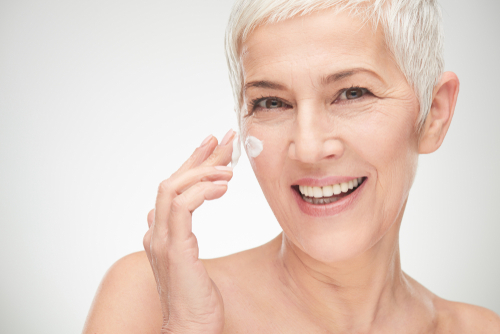Blog
Welcome to FaceForward
Get the scoop on all things beauty, wellness, and skincare.

Niacinamide has become a popular ingredient in many prescription and over-the-counter (OTC) skincare products.
For good reason.
The real key to unlocking all of niacinamide’s skin-healing benefits, however, is to know when and how to use it correctly.
If you’re wondering if niacinamide is worth the praise and are considering it in your skincare routine, this article is for you.
Below we outline everything you need to know about niacinamide, including why you should use it and how to combine it with other active ingredients to achieve more radiant skin.
Niacinamide is a vitamin B3 derivative—an essential nutrient for maintaining optimal health in the body.
Our bodies need vitamin B3 to help our major organs function properly. One of these organs (the largest, in fact) is the skin, and this is where niacinamide comes into play. While vitamin B3-rich foods or supplements are necessary and can help our bodies stay healthy, the skin needs something extra.
When niacinamide is used on the skin, it helps boost the skin’s cell turnover process.
This is when new cells are produced and pushed to the surface of the skin. Impurities and dead skin cells are also removed during this process. The normal cell turnover process is essential for maintaining healthy and youthful-looking skin. It happens constantly. Retinoids are another great way to speed up this healing and turnover process.
Niacinamide also moisturizes skin and improves its elasticity. It does this by strengthening and repairing the skin’s outer layer, also known as the epidermis.
When this layer is firm and moisturized, it can help the rest of the skin’s layers fight external damage from pollutants and irritants.
 Why Should You Use Niacinamide?
Why Should You Use Niacinamide?Dermatologists often recommend using niacinamide because it’s generally well-tolerated and unlikely to cause skin irritation for most people. In addition to its long list of benefits, niacinamide is also a great option for people of all skin types.
In the section below, we’ll take a closer look at why you should consider incorporating niacinamide into your skincare routine.
Keeping the skin hydrated with an ingredient like niacinamide is a great first step towards achieving a more radiant and healthy complexion.
The skin needs moisture! It’s key to flushing out toxins and transporting nutrients to different layers. Niacinamide prevents moisture from leaving the skin by helping it to build keratin—a protein that’s essential for forming a protective layer known as the skin barrier. Your skin barrier helps fight and eliminate harmful bacteria that can cause acne breakouts.
Niacinamide also helps our skin to boost ceramide production. These are cells that are important for keeping a soft skin texture, as well as retaining moisture and firmness.
Skin inflammation and redness are often the results of irritation, acne breakouts, or other skin conditions like rosacea.
Niacinamide inhibits the growth of cytokines—proteins that stimulate inflammation in cells. By reducing inflammation, niacinamide soothes the skin and can reduce visible signs of redness and irritation. Niacinamide also stabilizes excess sebum production—one of the main contributing factors to acne developing on the skin and becoming infected.
Controlling oil production allows niacinamide to keep skin clear, as well as prevent pores from becoming clogged and potentially being infected by bacteria.
This is why people with oily skin may also benefit from incorporating niacinamide into their skincare routine.
Niacinamide can also be used to treat and improve the appearance of hyperpigmentation.
This is a condition where dark patches appear on the skin due to acne scarring or excessive sun exposure. Research shows that niacinamide prevents melanosome cells from transferring pigment to the skin. This is part of what causes hyperpigmentation to become more noticeable.
Dermatologists often recommend a niacinamide serum or moisturizer with a 5% concentration for treating hyperpigmentation.
Skin elasticity is what keeps our complexion looking healthy and firm.
The skin naturally starts to lose elasticity as we get older due to a decrease in collagen production. Collagen is a protein that keeps the muscles and ligaments of the skin together, making it one of the main building blocks for a youthful complexion.
Niacinamide is a popular ingredient in anti-aging products because it helps the skin boost collagen production. By preventing the loss of elastin molecules—the proteins that help the skin maintain its shape after stretching—niacinamide fights wrinkles and tightens sagging skin.
As a vitamin B3 derivative, niacinamide has antioxidant properties that allow it to fight free radicals too.
Free radicals are unstable atoms that can damage skin cells and accelerate the appearance of premature aging. External factors like air pollution and nicotine products are among the most well-known contributors to free radicals in our bodies.
Not only does niacinamide help strengthen the inner layers of the epidermis, but it also protects the skin from free radical damage. By helping the skin repair itself over time, niacinamide also helps to minimize the appearance of external damage.
Niacinamide is generally a very well-tolerated skincare ingredient.
This means it can work well with other active ingredients like retinoids or vitamin C. We’ll go into more detail about these combinations in the next section.
It’s common to find niacinamide in OTC or prescription moisturizers, serums, and toners.
Compared to cleansers, the products above allow niacinamide to stay on the skin for longer and can deliver benefits to the skin over an extended period of time. Due to the fact that niacinamide is found in a variety of products, it can be easy to incorporate into your current skincare routine.

One of the most critical factors to unlocking niacinamide’s skin-healing benefits is knowing when to use it.
Dermatologists agree that niacinamide is generally gentle enough to be used twice a day.
Due to the fact that it works well with almost all active ingredients, niacinamide can be paired with both daytime and nighttime products. Using niacinamide during the day can help protect and repair the skin from sun damage. Niacinamide counteracts the inflammation caused by UV radiation, which makes it a good ingredient to use underneath your SPF.
If you use retinol, it’s also a good idea to incorporate niacinamide into your nighttime skincare routine. This is because retinol and other retinoids like tretinoin can cause irritated or sensitive skin. Niacinamide is also able to treat and soothe these adverse reactions, making it easier for your skin to tolerate retinoids or retinol.
As we mentioned before, niacinamide is a gentle and well-tolerated skincare ingredient. This means that it’s safe to use every day without severe reactions. However, it’s always a good idea to do a patch test on your hand or arm to check for any skin irritation your first time.
Dermatologists also recommend starting with a niacinamide concentration of 5% or so. This concentration is generally less likely to cause side effects. And, you can always work your way up to a higher concentration if your skin handles your formula well.
Niacinamide works well with nearly every other skincare ingredient on the market because it’s so well-tolerated. Below, we outline our top ingredient pairings for optimal skin health.
Both niacinamide and hyaluronic acid are water-based ingredients. They are both effective in hydrating the inner layers of the skin.
When hyaluronic acid and niacinamide work together, they attract and bind to water molecules while locking them into place. This prevents moisture from leaving the skin as easily. These ingredients are great for moisturizing the skin while improving firmness and boosting collagen production.
Salicylic acid is an oil-based exfoliator that works deep within the skin’s layers to regulate sebum production.
It also breaks down excess oil that gets trapped in the pores to reduce breakouts. Although it’s an effective acne treatment, salicylic acid can dehydrate and irritate the skin. By keeping the skin moisturized and soothed, niacinamide can counterbalance these negative side effects. It’s a good pairing.
Products that contain vitamin C are often used to accelerate the production of elastin and collagen to help the skin appear more firm.
Both vitamin C and niacinamide help combat sun damage and hyperpigmentation to improve the appearance of uneven skin tone.
However, people with sensitive skin may find that vitamin C causes the skin to become red, irritated or dry.
Due to niacinamide’s skin soothing properties, it can help reduce the risk of these side effects and keep the skin feeling hydrated and soft.
At Nava MD, we specialize in helping men and women find the right ingredients to maintain optimal skin health and address common skin conditions like acne, wrinkling, and dark spots. Our dermatologists prescribe custom prescription skincare formulas with a variety of FDA-approved ingredients.
We’ve made it easier than ever before to get a dermatologist’s help from the comfort of home.
Most of our prescription formulas contain niacinamide as one of the main ingredients.
Our formulations are selected and blended to be gentle on the skin and can usually be combined with any of your other favorite skincare products.
Start your journey to healthy skin with Nava MD today. Free shipping, free consultation if approved, no doctor office visits, medications at your door.
This article is intended for informational purposes only and should not be considered medical advice.
Consult a healthcare professional or call a doctor in the case of a medical emergency